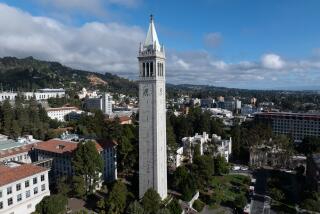SANTA MONICA : RAND Opens Mideast Studies Center
- Share via
The RAND Corp., internationally famous for its Cold War-era defense analyses, has opened a Middle East studies center, hoping to adopt its regional and social policy expertise to the pursuit of peace in the war-torn area.
“The striking aspect of the region is its sheer dysfunctionality, its retarded human progress, which poses great risks for the world,” said David Gombert, a RAND vice president. “We can bring a wide range of talent in resource management, labor issues, education and the environment to the area.”
RAND officials said the new center reflects the think tank’s move away from military issues toward civilian concerns.
“We hope to influence individuals and institutions in the Middle East by setting up conferences, exchange programs, visiting scholar projects and seminars to discuss the area’s mutual problems and interests,” said Mary Morris, associate director of the new center.
RAND policy analysts met Tuesday with a large group of influential Jewish, Arab, Turkish and Iranian Americans after a Jewish settler’s massacre of 48 Muslims in Hebron last Friday.
The round-table discussion centered on suggested solutions to the region’s myriad problems, including a poor economy and political instability.
“For any growth, the area needs political stability before any investment can take place,” said Talat Othman, president of Dearforn Financial.
However, Joe Jacobs, president of Jacobs Engineering Group and a self-proclaimed scarred business veteran of the Middle East, said economic cooperation remains the best antidote to political passions.
“An economic model must be set up despite the region’s political problems,” he said. “A concrete economic prize held up at the end of the peace process with defined objectives will be a force compelling a political solution. The political and economic elements are not mutually exclusive.”
Other analysts encouraged the center to study the broader issues of the Middle East and surrounding areas.
“Don’t ignore Algeria and Afghanistan--the effort should not be just Arabs and Israelis,” said Jerrold Green, director of the University of Arizona’s Center for Middle Eastern Studies.
Some believe RAND could be a powerful force because it is the world’s largest nonprofit organization, with more than 1,100 consultants and research analysts, and with decades of experience studying public policy issues.
“Better economic models and education projects will weave a tapestry of peace through the Middle East,” said Irving Boren, president of the Boren Foundation, which recently donated $1 million to the center. “An impartial group like RAND will make such programs readily acceptable.”
More to Read
Sign up for Essential California
The most important California stories and recommendations in your inbox every morning.
You may occasionally receive promotional content from the Los Angeles Times.











